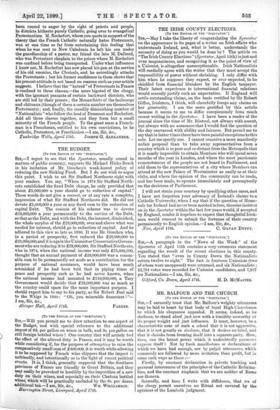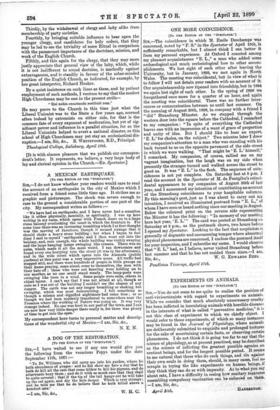MR. BALFOUR AND THE CHURCH.
(To THE EDITOR OP THE "SPECTATOR.") earnestly trust that Mr. Balfour's weighty utterances may be laid to heart by that body of loyal High Churchmen to which his eloquence appealed. It seems, indeed, as he declares, to stand aloof just now with a timidity unworthy of its proper weight and just influence. It must, however, be a characteristic note of such a school that it is not aggressive, that it is not greatly en evidence, that it desires no label, and that it shrinks from forming itself into a separate party. How, then, can the latent power which it undoubtedly possesses express itself? Not by fresh manifestoes or declarations of which we have had enough, nor by pulpit utterances, which commonly are followed by more irritation than profit, but in some such ways as these :— Firstly, by constant declaration in private teaching and personal intercourse of the principles of the Catholic Reforma- tion, and the constant emphasis that we are neither of Rome nor Geneva. '
Secondly, and here I write with diffidence,. that we of the clergy permit ourselves no Ritual not covered by the opinions of the Lambeth judgment. Thirdly, by the withdrawal of clergy and laity alike from membership of party societies.
Fourthly, by bringing suitable influence to bear upon the younger clergy, and candidates for holy orders, that they may be led to see the triviality of mere Ritual in comparison with the paramount importance of the doctrines, mission, and work of the English Church.
Fifthly, and this again for the clergy, that they may more justly appreciate that general view of the laity, which, while it is not indifferent to sound doctrine, is markedly against extravagances, and is steadily in favour of the sober-minded position of the English Church, as indicated, for example, by her great interpreter, Richard Hooker.
By a quiet insistence on such lines as these, and by patient employment of such methods, I venture to say that the modest High Churchman may be one in the present strife- " Qui nobis cunctando restituit rem."
He may prove to the Church in this time just what the Liberal Unionist was to the State a few years ago, scorned often indeed by extremists on either side, for that is the common fate of every exponent of moderation, but yet of sig- nificant power and influence in a parallel situation, for as the Liberal Unionists helped to avert a national disaster, so this school of High Churchmen may yet stay an ecclesiastical dis- ruption.—I am, Sir, &c., B. WHITEFOORD, B.D., Principal. Theological College, Salisbury, April 15th.
(It is with sincere pleasure that we publish our correspon- dent's letter. It represents, we believe, a very large body of lay and clerical opinion in the Church.—ED. Spectator.)







































 Previous page
Previous page